Overview
The article emphasizes the importance of advanced ECG analysis technologies, with particular focus on the MaxYield™ platform, in improving the diagnosis and management of 12 lead hyperkalemia. It begins by outlining the challenges faced in ECG analysis, which can hinder timely and accurate clinical decisions. Following this, the MaxYield™ platform is introduced, detailing its automation of ECG feature detection, which significantly streamlines the assessment process. This automation not only provides rapid and accurate evaluations but also supports healthcare professionals in making informed clinical decisions. Ultimately, the integration of MaxYield™ results in enhanced patient outcomes, showcasing its vital role in modern healthcare.
Introduction
Hyperkalemia, characterized by elevated potassium levels in the blood, poses significant risks to cardiac health. This condition necessitates accurate and timely diagnosis, making it crucial for healthcare professionals to have effective tools at their disposal. Health tech developers face the challenge of creating innovative solutions that enhance ECG analysis. Such advancements enable healthcare professionals to identify and respond to the critical indicators of hyperkalemia more effectively.
The MaxYield™ platform offers a range of features designed to improve ECG analysis. By leveraging advanced algorithms and real-time data processing, it enhances the accuracy of readings and reduces the risk of misdiagnosis. This platform not only streamlines the workflow for healthcare providers but also integrates seamlessly with existing systems, ensuring minimal disruption.
The advantages of the MaxYield™ platform extend beyond mere functionality. By improving ECG analysis, it empowers healthcare professionals to make informed decisions swiftly, ultimately leading to better patient outcomes. In a clinical setting, the ability to quickly identify and address hyperkalemia can significantly reduce the risk of cardiac events, improving overall patient care.
In summary, the integration of advanced technologies like the MaxYield™ platform into hyperkalemia management represents a transformative step forward. By enhancing ECG analysis and facilitating timely interventions, it holds the potential to greatly improve patient outcomes in clinical practice.
Neural Cloud Solutions: MaxYield™ for Enhanced ECG Analysis in Hyperkalemia
ECG analysis presents significant challenges, particularly in identifying conditions such as 12 lead hyperkalemia. The 'Neural Cloud Solutions' platform addresses these challenges by automating the detection and labeling of critical ECG features. This advanced system allows for rapid identification of cardiac signals related to 12 lead hyperkalemia, which is essential for healthcare professionals needing to make swift, informed decisions based on accurate data.
The MaxYield™ platform boasts advanced noise filtering and adaptive algorithms that efficiently process vast amounts of ECG data. This ensures that clinicians receive timely insights into a patient's cardiac status, which is crucial for effectively managing 12 lead hyperkalemia. By providing beat-by-beat evaluations and emphasizing key aspects, the platform significantly improves diagnostic yield.
Ultimately, these capabilities aid in assured clinical decision-making, allowing healthcare professionals to respond promptly to critical situations. The integration of such technology not only enhances the accuracy of ECG analysis but also supports better patient outcomes in the management of 12 lead hyperkalemia.

ECG Changes: Key Indicators of Hyperkalemia
Key ECG changes indicative of 12 lead hyperkalemia include:
- Peaked T-waves
- Widening of the QRS complex
- Presence of a sine-wave pattern
These alterations occur due to the effects of elevated potassium levels on cardiac myocyte depolarization and repolarization. In the realm of ECG analysis, timely recognition of changes related to 12 lead hyperkalemia is crucial, as it can significantly impact patient outcomes.
MaxYield™ enhances ECG analysis by providing beat-by-beat evaluation, capable of handling 200,000 heartbeats in under 5 minutes. This platform utilizes automated ECG processing to convert noisy recordings into detailed insights. By incorporating MaxYield™, developers can facilitate rapid identification of critical changes, ultimately supporting confident clinical decisions through clear and actionable data.
The advantages of using MaxYield™ are significant for healthcare professionals. With its ability to accurately detect ECG changes in real-time, the platform not only improves the efficiency of ECG analysis but also enhances the quality of patient care. This capability empowers clinicians to make informed decisions swiftly, thereby improving overall patient outcomes.

Pathophysiology of Hyperkalemia: Understanding Its Effects on Cardiac Function
Hyperkalemia significantly impacts cardiac function by altering the resting membrane potential of cardiac cells. This alteration leads to impaired conduction and increased excitability. Elevated potassium levels can disrupt normal cardiac rhythms, which may result in life-threatening arrhythmias. Understanding these mechanisms is crucial for health tech developers, as it enables them to create ECG evaluation tools that can predict and alert clinicians to these dangerous changes.
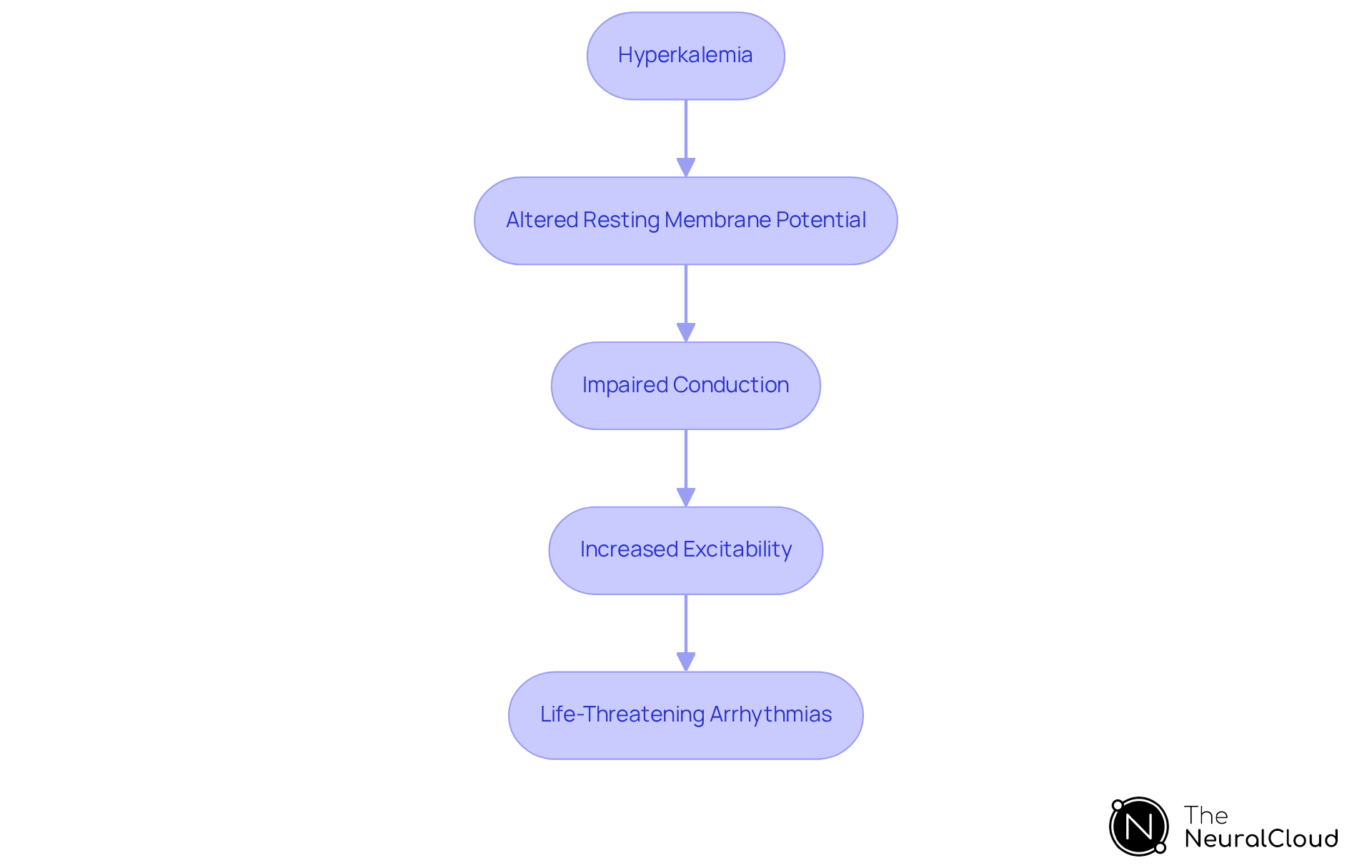
Etiology of Hyperkalemia: Common Causes and Risk Factors
Common causes of hyperkalemia include renal failure, excessive potassium intake, and certain medications such as ACE inhibitors and potassium-sparing diuretics. Risk factors encompass chronic kidney disease, diabetes, and heart failure. Addressing these challenges in ECG analysis, developers should consider integrating an automated ECG evaluation platform. This platform maps ECG signals amidst noise and provides a beat-by-beat assessment. Such integration can significantly enhance the evaluation of these risk factors within ECG analysis tools, aiding healthcare providers in identifying at-risk patients more effectively.
MaxYield™ stands out by transforming noisy recordings into detailed insights through advanced noise reduction and adaptive algorithms. This feature enables healthcare professionals to make confident clinical decisions by ensuring clarity in ECG readings. The advantages of using MaxYield™ are manifold:
- It not only improves the accuracy of ECG analysis but also streamlines the process, allowing for quicker assessments and timely interventions.
- By incorporating this technology, healthcare providers can enhance patient care and outcomes, ultimately supporting better management of conditions associated with 12 lead hyperkalemia.

Symptoms of Hyperkalemia: Recognizing Clinical Signs
Elevated potassium levels can lead to a spectrum of symptoms, from mild to severe. Common manifestations include:
- Muscle weakness
- Fatigue
- Palpitations
In more severe instances, these symptoms may escalate to cardiac arrest, highlighting the critical nature of monitoring potassium levels to prevent 12 lead hyperkalemia. To enhance patient care, developers should focus on creating tools that not only analyze ECG data but also integrate patient symptom tracking. This comprehensive approach allows healthcare professionals to better understand patient conditions and respond effectively.
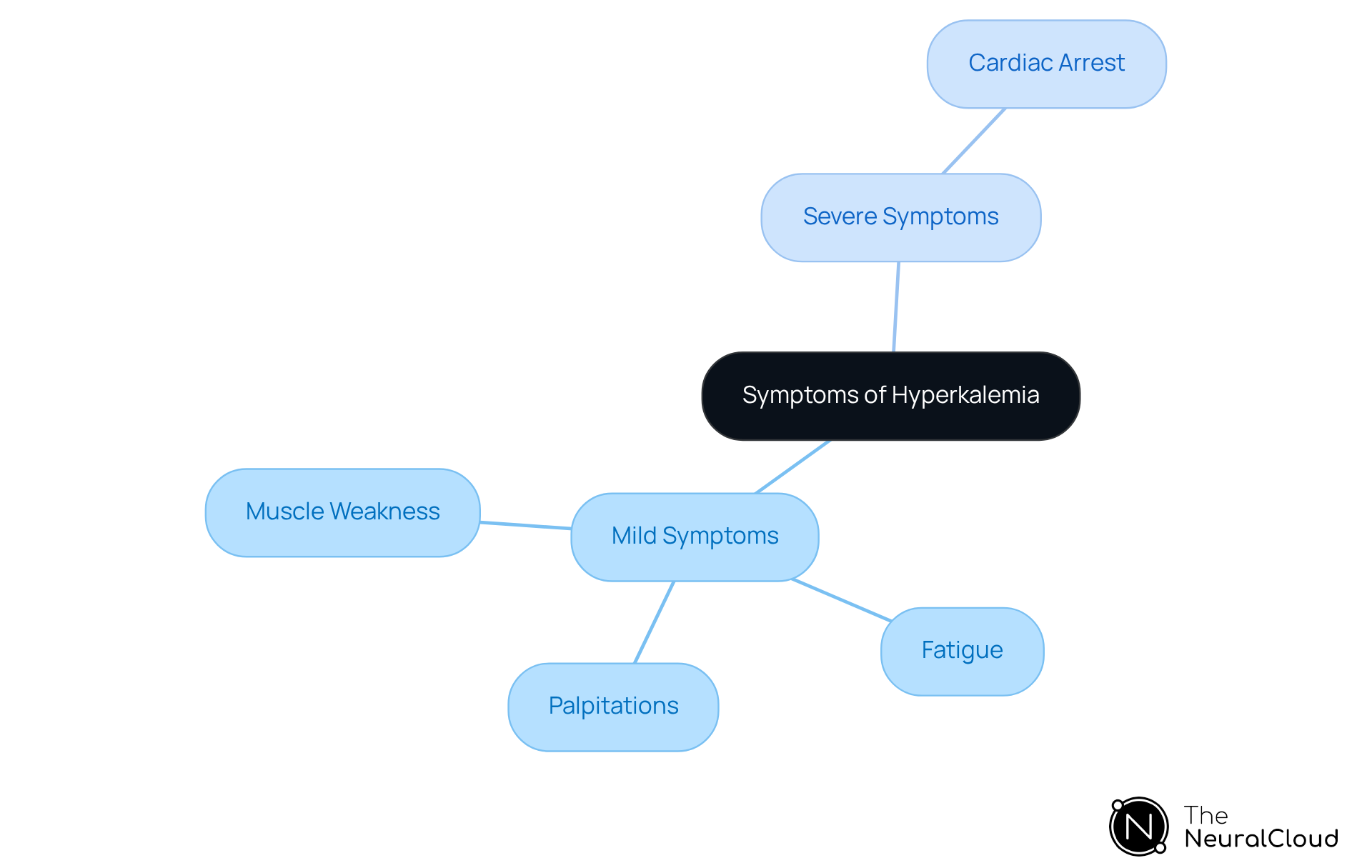
Diagnosis of Hyperkalemia: Essential Tests and Evaluations
Diagnosing elevated potassium levels generally requires serum potassium level testing, ECG evaluation, and renal function assessment. However, ECG analysis can present challenges, particularly in noisy environments. To address this, developers should integrate features that combine lab results with ECG data, offering a comprehensive view of the patient's condition and facilitating timely diagnosis.
MaxYield™, an advanced automated ECG analysis platform from Neural Cloud Solutions, significantly enhances the diagnostic process. It effectively maps ECG signals through noise, providing a beat-by-beat analysis of 200,000 heartbeats in under 5 minutes. This rapid processing capability emphasizes critical ECG information, thereby improving diagnostic precision.
The benefits of MaxYield™ are substantial for healthcare professionals. By enabling swift and accurate ECG analysis, it aids clinical decision-making in cases of 12 lead hyperkalemia. The platform not only streamlines the diagnostic workflow but also supports better patient outcomes through timely interventions.
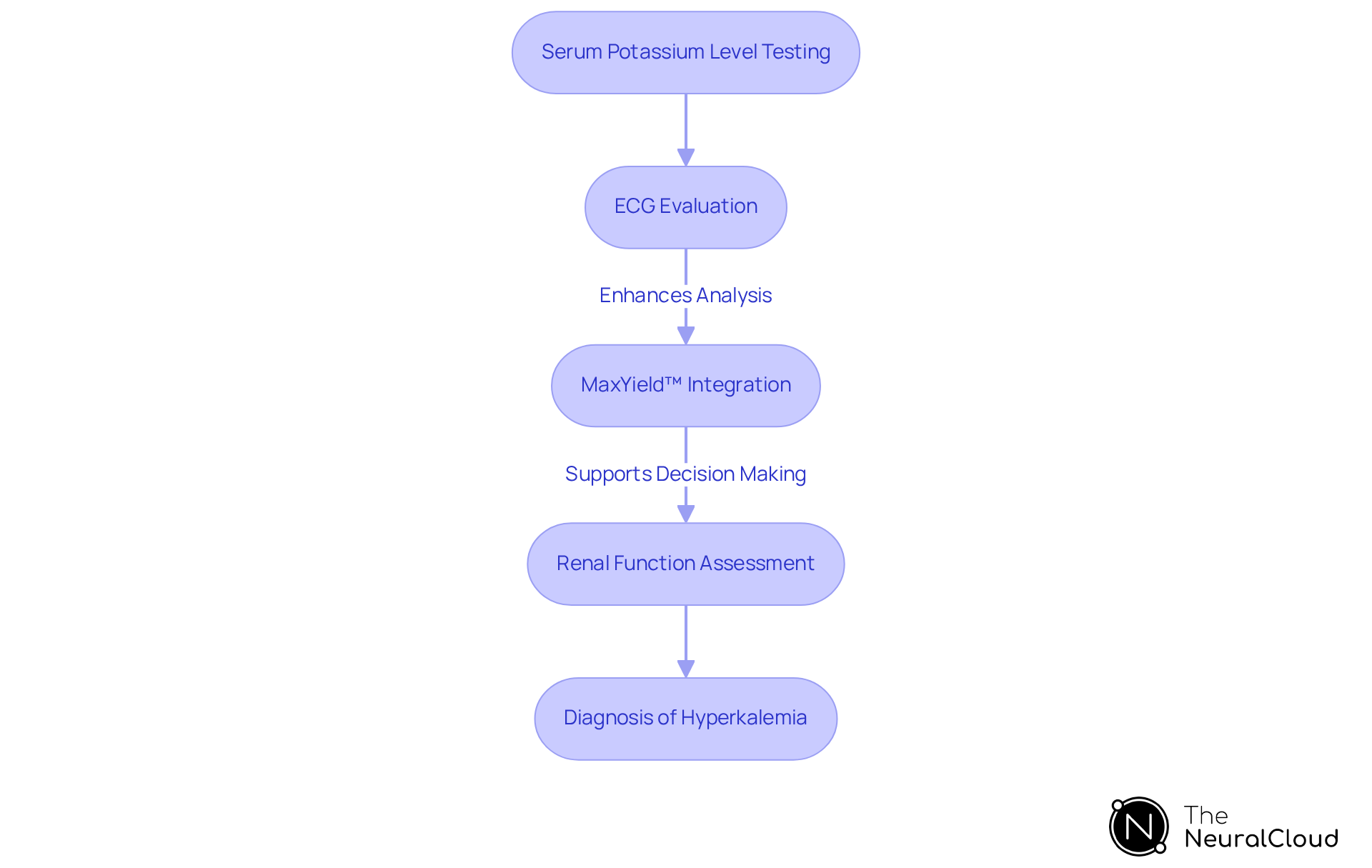
Management of Hyperkalemia: Treatment Options and Protocols
The management of hyperkalemia, particularly 12 lead hyperkalemia, presents challenges, especially in monitoring treatment effectiveness through ECG analysis. Dietary modifications and medications such as calcium gluconate, insulin, and beta-agonists are common approaches, with dialysis reserved for severe cases. To address these challenges, developers should focus on creating tools that assist clinicians in tracking treatment outcomes effectively. Utilizing Neural Cloud Solutions' platform, these tools can enhance ECG evaluation.
MaxYield™ stands out as a solution by offering advanced features that improve ECG analysis. This platform incorporates sophisticated noise reduction and artifact management, transforming noisy recordings into detailed insights. Key evaluations include P-wave, QRS complex, and T-wave analysis, which are crucial for accurate cardiac assessments.
The advantages of integrating MaxYield™ are significant for healthcare professionals. The platform enables prompt interventions by providing beat-by-beat evaluations of 200,000 heartbeats in under 5 minutes. This rapid analysis supports assured clinical decisions, allowing clinicians to respond effectively to patient needs.
In summary, the MaxYield™ platform not only enhances ECG analysis but also empowers healthcare providers with the tools necessary for effective treatment management. By focusing on features that ensure accuracy and clarity, developers can create solutions that significantly benefit clinical practice.
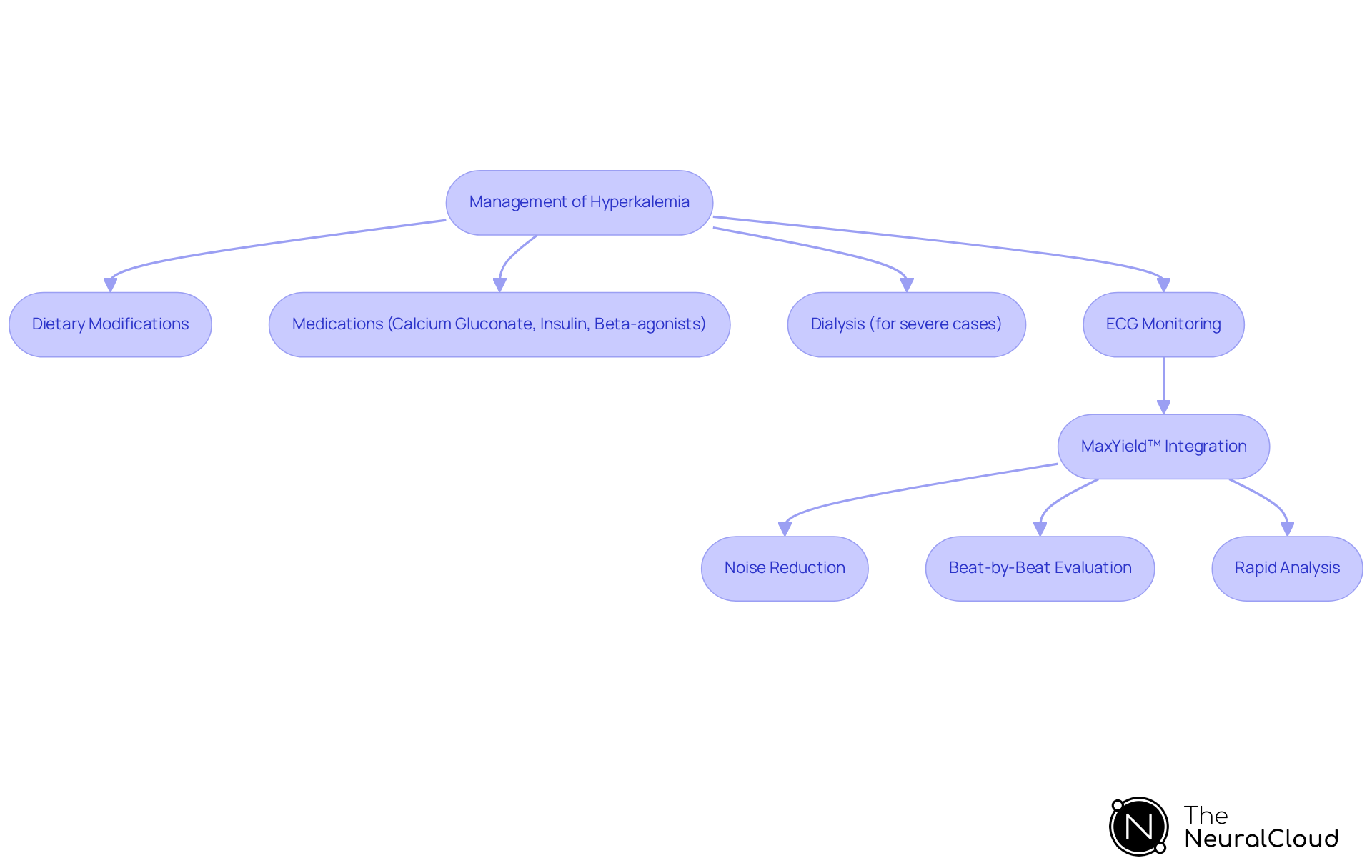
Complications of Hyperkalemia: Risks and Considerations
Complications that can arise from 12 lead hyperkalemia include life-threatening arrhythmias, cardiac arrest, and muscle paralysis. In light of these risks, developers should consider integrating alert systems into their ECG evaluation tools. These systems can notify healthcare providers of significant changes in cardiac rhythm, enabling prompt intervention and reducing the chances of complications.
Utilizing Neural Cloud Solutions' platform can significantly enhance this process. This system streamlines ECG evaluation by effectively charting ECG signals amidst noise, allowing for the identification and tagging of essential characteristics in each heartbeat, including the P-wave, QRS complex, and T-wave beginnings and endings. This advanced AI-driven solution delivers detailed insights, processing 200,000 heartbeats in under 5 minutes. Such capabilities can assist developers in creating more responsive alert systems.
By incorporating this innovative solution, developers can ensure their tools not only highlight potentially meaningful ECG data but also support confident clinical decisions, ultimately leading to improved patient outcomes.
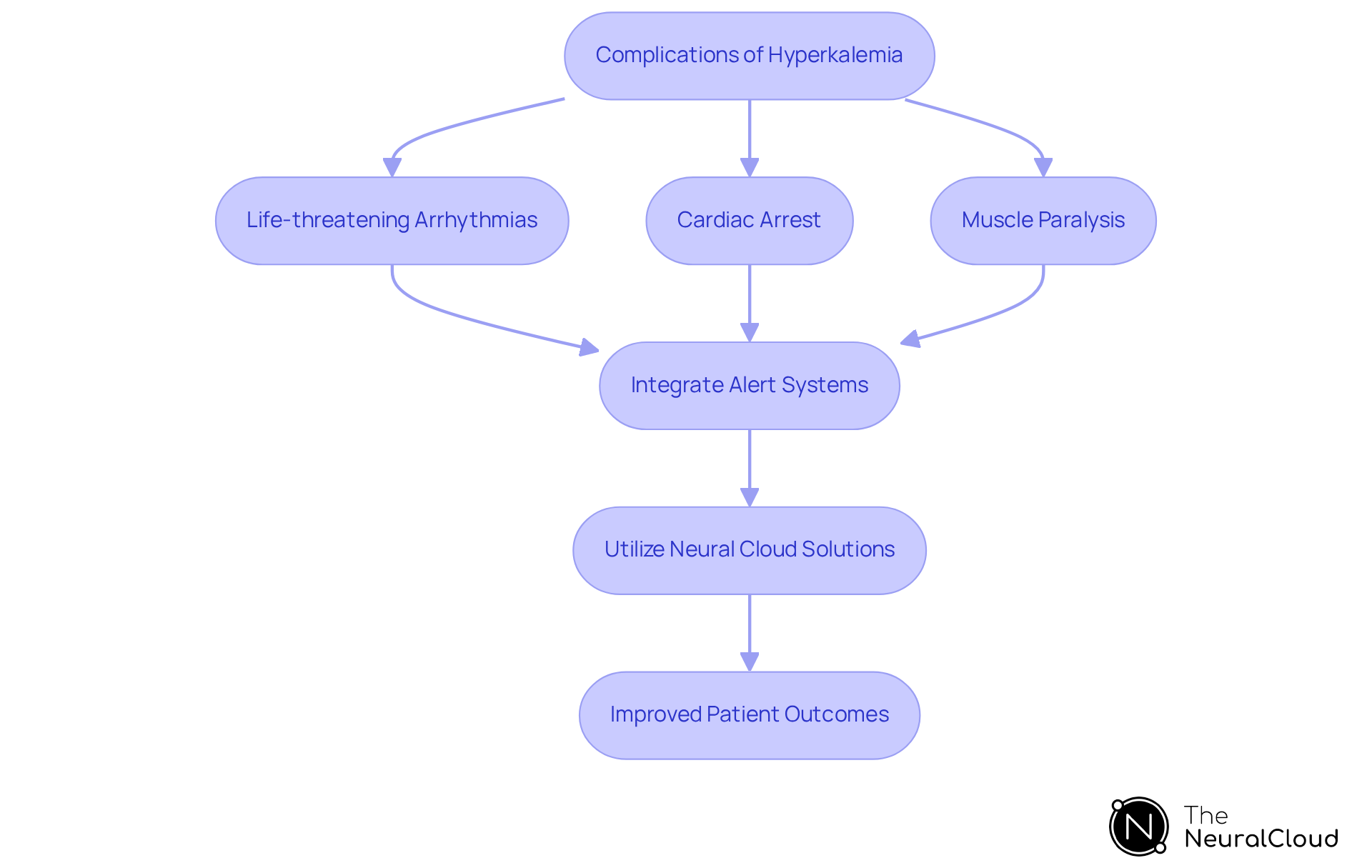
Epidemiology of Hyperkalemia: Prevalence and Demographic Insights
Hyperkalemia is particularly prevalent in populations with chronic kidney disease, diabetes, and heart failure. Understanding these demographics is crucial for developers aiming to tailor their ECG evaluation tools to meet the specific needs of these patient groups. This ensures that their solutions are both relevant and effective. By integrating MaxYield™, an automated ECG evaluation platform, developers can enhance their tools with advanced features that effectively map ECG signals through noise, isolating key aspects of each heartbeat.
The MaxYield™ platform enables rapid beat-by-beat examination, providing insights from 200,000 heartbeats in under five minutes. This thorough analysis not only strengthens clinical decision-making but also addresses the physiological variability and signal artifacts associated with 12 lead hyperkalemia. By surpassing conventional constraints in ECG interpretation, MaxYield™ refines ECG analysis tools to tackle the distinct challenges posed by 12 lead hyperkalemia and its related rhythms.
In summary, the MaxYield™ platform offers healthcare professionals a robust solution for ECG analysis, enhancing their ability to make informed clinical decisions while ensuring that the tools are optimized for the challenges of 12 lead hyperkalemia.
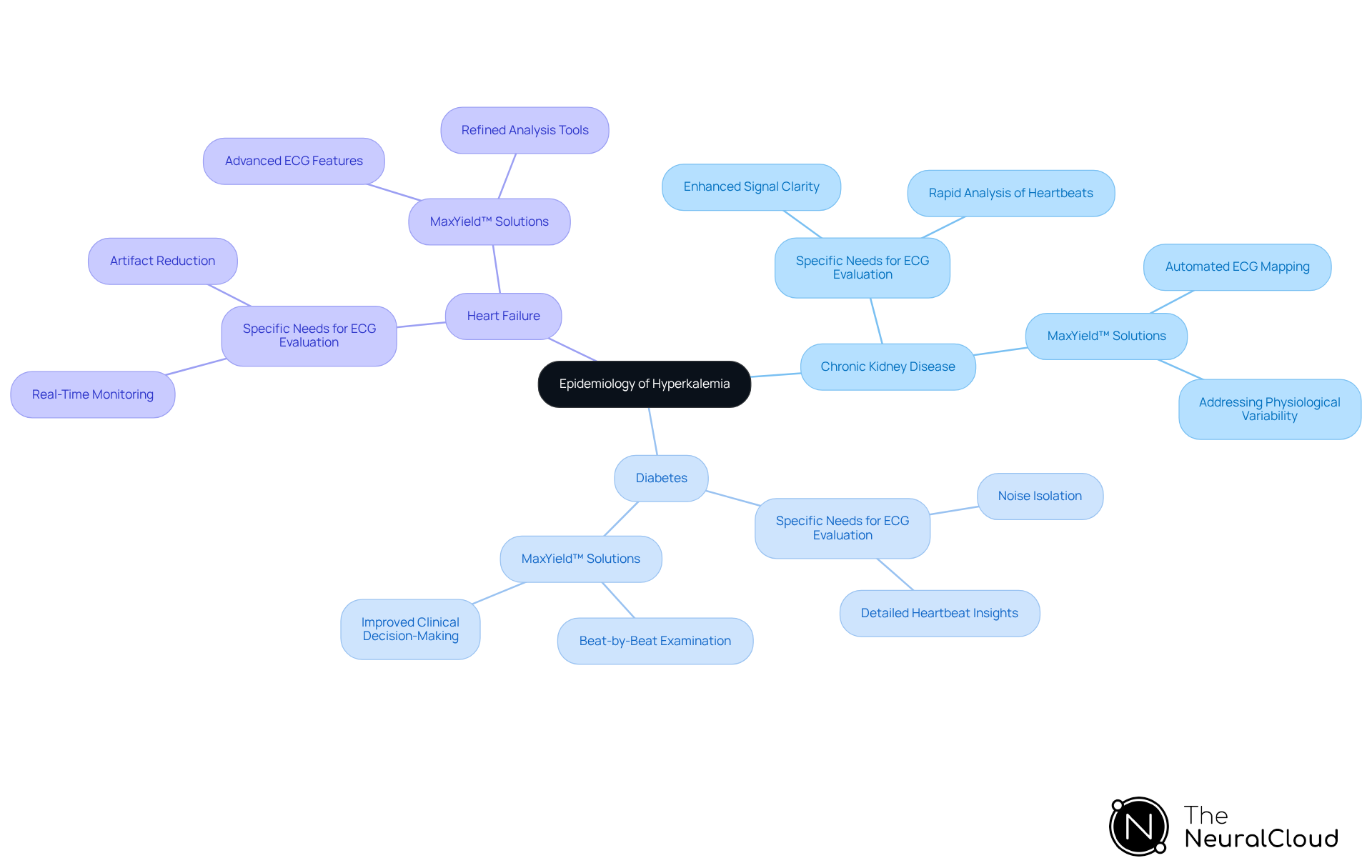
Prevention of Hyperkalemia: Strategies for Healthcare Professionals
Preventive strategies for 12 lead hyperkalemia encompass:
- Regular monitoring of potassium levels in at-risk patients
- Dietary counseling
- Meticulous management of medications that may raise potassium levels
Developers should prioritize features that enhance patient education and monitoring. This empowers healthcare professionals to effectively implement prevention strategies in their practice, ensuring better patient outcomes and more informed decision-making.

Conclusion
The exploration of 12 lead hyperkalemia reveals the critical role that advanced ECG analysis plays in enhancing patient care. By leveraging technologies like Neural Cloud Solutions' MaxYield™, healthcare professionals are equipped with the tools necessary for swift and accurate detection of hyperkalemia indicators. This ultimately facilitates informed clinical decisions. The integration of technology not only improves diagnostic precision but also significantly supports better management of this potentially life-threatening condition.
Key insights throughout the article highlight various aspects of hyperkalemia, including its pathophysiology, common causes, symptoms, and the significance of timely diagnosis. The discussion underscores the challenges healthcare providers face in monitoring and managing this condition, especially in noisy environments where ECG readings can be compromised. By employing automated analysis platforms, clinicians can transform complex data into actionable insights, ensuring that critical changes are recognized and addressed promptly.
In light of these advancements, it is essential for health tech developers to prioritize the creation of robust ECG evaluation tools that can effectively respond to the challenges posed by hyperkalemia. The ongoing development of innovative solutions will enhance diagnostic capabilities and empower healthcare professionals to implement effective prevention strategies. Ultimately, this leads to improved patient outcomes. Embracing these technologies is a vital step toward mitigating the risks associated with hyperkalemia and ensuring that patients receive the highest standard of care.
Frequently Asked Questions
What challenges does ECG analysis face in identifying hyperkalemia?
ECG analysis faces significant challenges in identifying conditions such as 12 lead hyperkalemia, particularly in detecting and labeling critical ECG features.
How does the MaxYield™ platform enhance ECG analysis for hyperkalemia?
The MaxYield™ platform automates the detection and labeling of critical ECG features, allowing for rapid identification of cardiac signals related to 12 lead hyperkalemia, which is essential for informed clinical decisions.
What features does MaxYield™ offer to improve ECG data processing?
MaxYield™ boasts advanced noise filtering and adaptive algorithms that efficiently process large amounts of ECG data, providing timely insights into a patient's cardiac status.
What are the key ECG changes indicative of hyperkalemia?
Key ECG changes indicative of 12 lead hyperkalemia include peaked T-waves, widening of the QRS complex, and the presence of a sine-wave pattern.
How does hyperkalemia affect cardiac function?
Hyperkalemia alters the resting membrane potential of cardiac cells, leading to impaired conduction and increased excitability, which can disrupt normal cardiac rhythms and result in life-threatening arrhythmias.
What is the significance of timely recognition of ECG changes in hyperkalemia?
Timely recognition of ECG changes related to 12 lead hyperkalemia is crucial as it can significantly impact patient outcomes and enable healthcare professionals to respond promptly to critical situations.
How does MaxYield™ improve the efficiency of ECG analysis?
MaxYield™ enhances the efficiency of ECG analysis by providing beat-by-beat evaluations capable of handling 200,000 heartbeats in under 5 minutes, converting noisy recordings into detailed insights.
What benefits does the integration of MaxYield™ offer to healthcare professionals?
The integration of MaxYield™ allows healthcare professionals to accurately detect ECG changes in real-time, improving the efficiency of ECG analysis and enhancing the quality of patient care, ultimately supporting confident clinical decisions.






